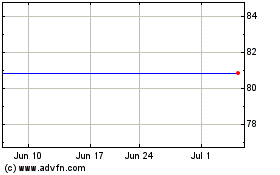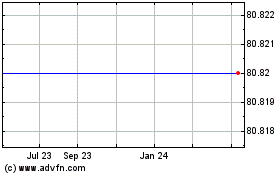UPDATE: Boston Scientific 1Q Loss Widens; Outlook Reduced
April 26 2010 - 7:39PM
Dow Jones News
Boston Scientific Corp.'s (BSX) first-quarter loss widened on a
steep write-down related to its U.S. heart-rhythm business, which
endured a month-long halt in defibrillator sales that caused the
company to slice its full-year guidance.
The Natick, Mass., company temporarily stopped U.S.
defibrillator sales in mid-March, affecting the tail end of the
first quarter, because it neglected to file paperwork with the Food
and Drug Administration covering some manufacturing changes. Those
changes were approved a month later and Boston Scientific's most
important defibrillators are back on sale, but the question has
been what the lasting impact will be.
Boston Scientific provided some context Monday by lowering its
projected full-year sales guidance by $500 million, below Wall
Street forecasts. Meantime, its U.S. defibrillator sales fell 21%
to $312 million in the first quarter, missing the midpoint of a
range the company had projected by $64 million.
Shares slipped in after-hours trading and were recently down
3.7% at $6.80.
The impact of the sales halt plus an outlook for slower market
growth caused Boston Scientific to take the $1.8 billion write-down
of goodwill associated with the domestic heart-rhythm business. It
bought this business by acquiring Guidant Corp. four years ago for
about $27 billion.
The products at issue, known as implantable cardioverter
defibrillators, or ICDs, provide shocks when needed to treat
potentially deadly rhythm problems.
"They're looking at weaker ICD sales as they come back into the
market in the U.S.," said Jan Wald, an analyst at Noble
Financial.
He thinks Boston Scientific can dodge lasting damage because it
was sidelined by paperwork issues rather than actual product
problems. But it was easy for doctors to switch to devices from
rivals Medtronic Inc. (MDT) and St. Jude Medical Inc. (STJ) during
the outage, and other analysts expect Boston Scientific will
permanently cede roughly four or five points of U.S. market
share.
The company posted a first-quarter loss of $1.59 billion, or
$1.05 a share, compared with a year-earlier loss of $13 million, or
a penny a share. The latest results included the write-down, among
other items, while year-earlier results included $302 million, or
about 20 cents in charges.
The company said the write-down has no impact on debt covenants,
which have been getting some scrutiny on Wall Street lately due to
Boston Scientific's reduced sales and some big payment obligations
due next year.
Net sales declined 2.5% to $1.96 billion. Excluding currency
translation and sales from divested businesses, sales were down
6%.
Results missed Boston Scientific's targets, which it set before
the ICD issue popped up.
Overall ICD sales declined 12% to $390 million, but
international sales grew 9% to $144, suggesting the domestic issues
haven't spilled over into overseas markets. Boston Scientific
recently disclosed yet more paperwork lapses it must clear with the
FDA to get older defibrillators back, but this is more a lingering
regulatory issue than a threat to sales, since the most widely used
products are back.
The company disclosed on Monday that Fredericus Colen, who had
been in charge of the heart-rhythm business but was promoted in
February to the role of chief technology officer, is retiring
effective June 30 for family reasons.
In Boston Scientific's other closely watched market, for
drug-coated stent scaffolds for heart arteries, sales sank 8.5% to
$407 million. This business is under pressure from tough
competition and sliding product prices. Still, sales landed in the
middle of the company's projected range.
For the full year, the company is now forecasting a loss 88
cents to $1 per share due in part to the $1.8 billion impairment
charge for the U.S. heart-rhythm business. Excluding items, it
projects earnings of 50 cents to 60 cents per share, down 12 cents
from the February forecast.
It forecast second-quarter results that range from a loss of 3
cents a share to earnings of 2 cents a share, or adjusted earnings
of 6 cents to 10 cents per share. It sees sales in the quarter
ranging between $1.83 billion and $1.93 billion.
Analysts anticipated 8 cents and higher sales of $2 billion.
-By Jon Kamp, Dow Jones Newswires; 617-654-6728;
jon.kamp@dowjones.com
(John Kell contributed to this article.)
SJM (NYSE:STJ)
Historical Stock Chart
From Jun 2024 to Jul 2024

SJM (NYSE:STJ)
Historical Stock Chart
From Jul 2023 to Jul 2024
